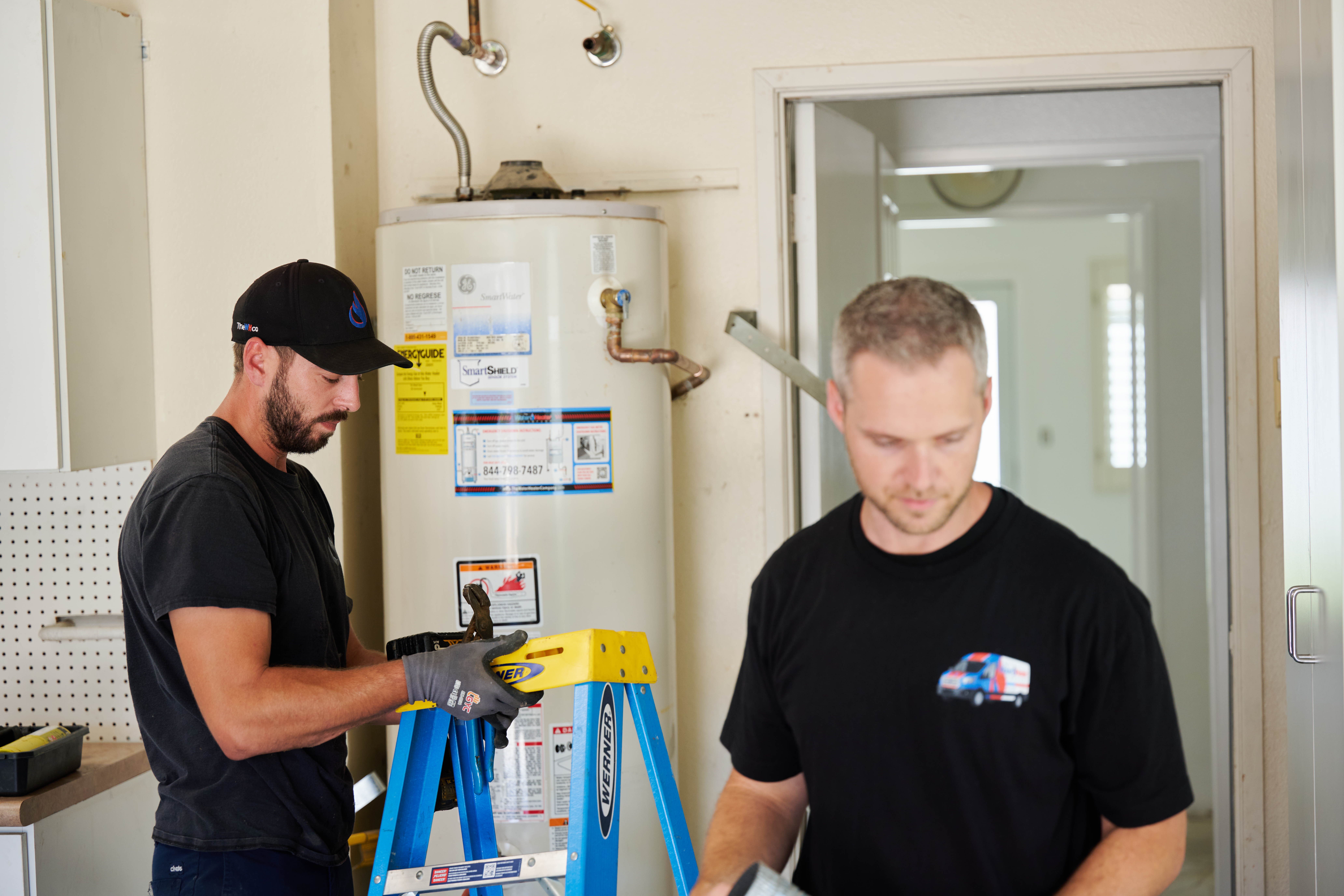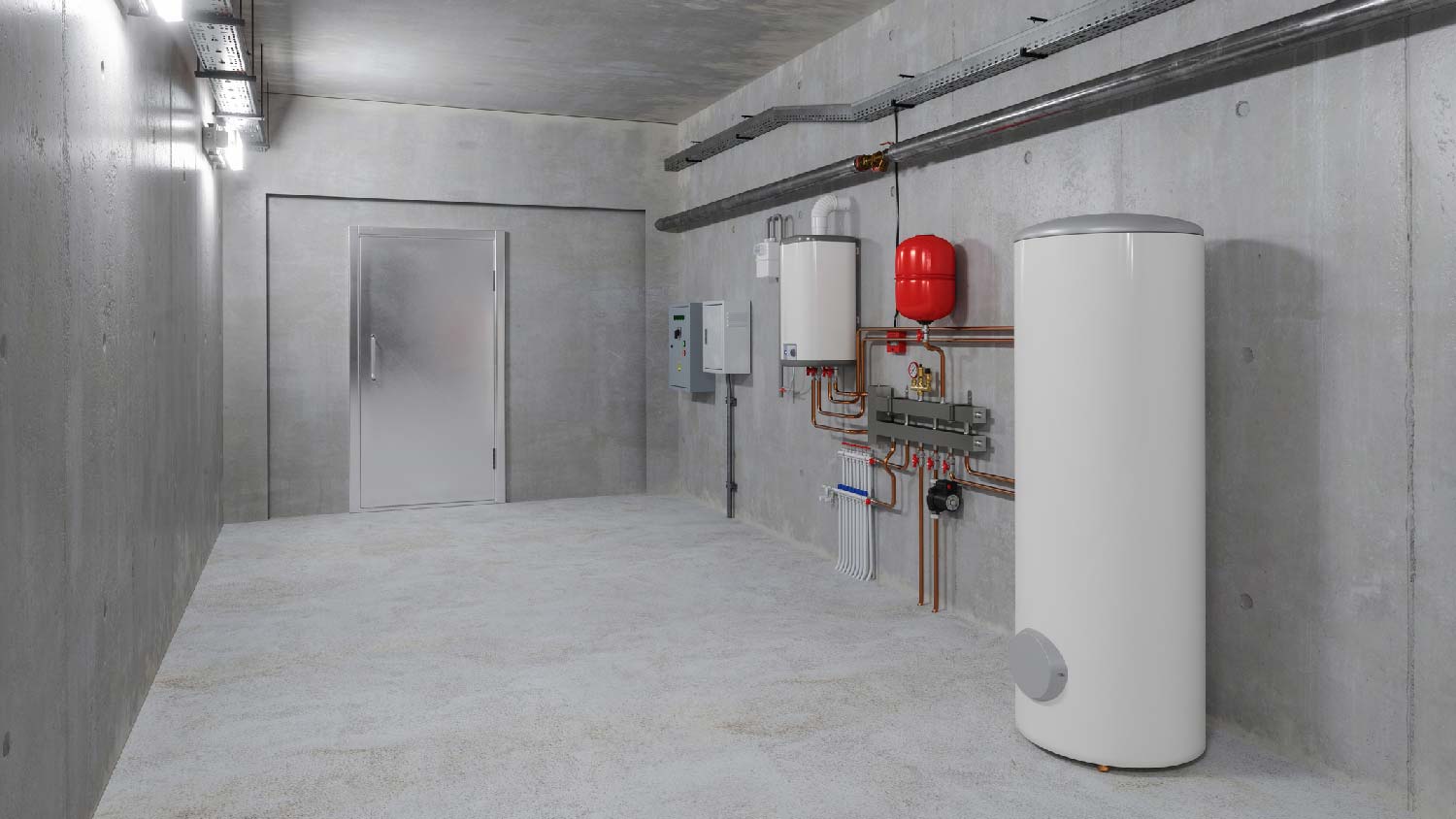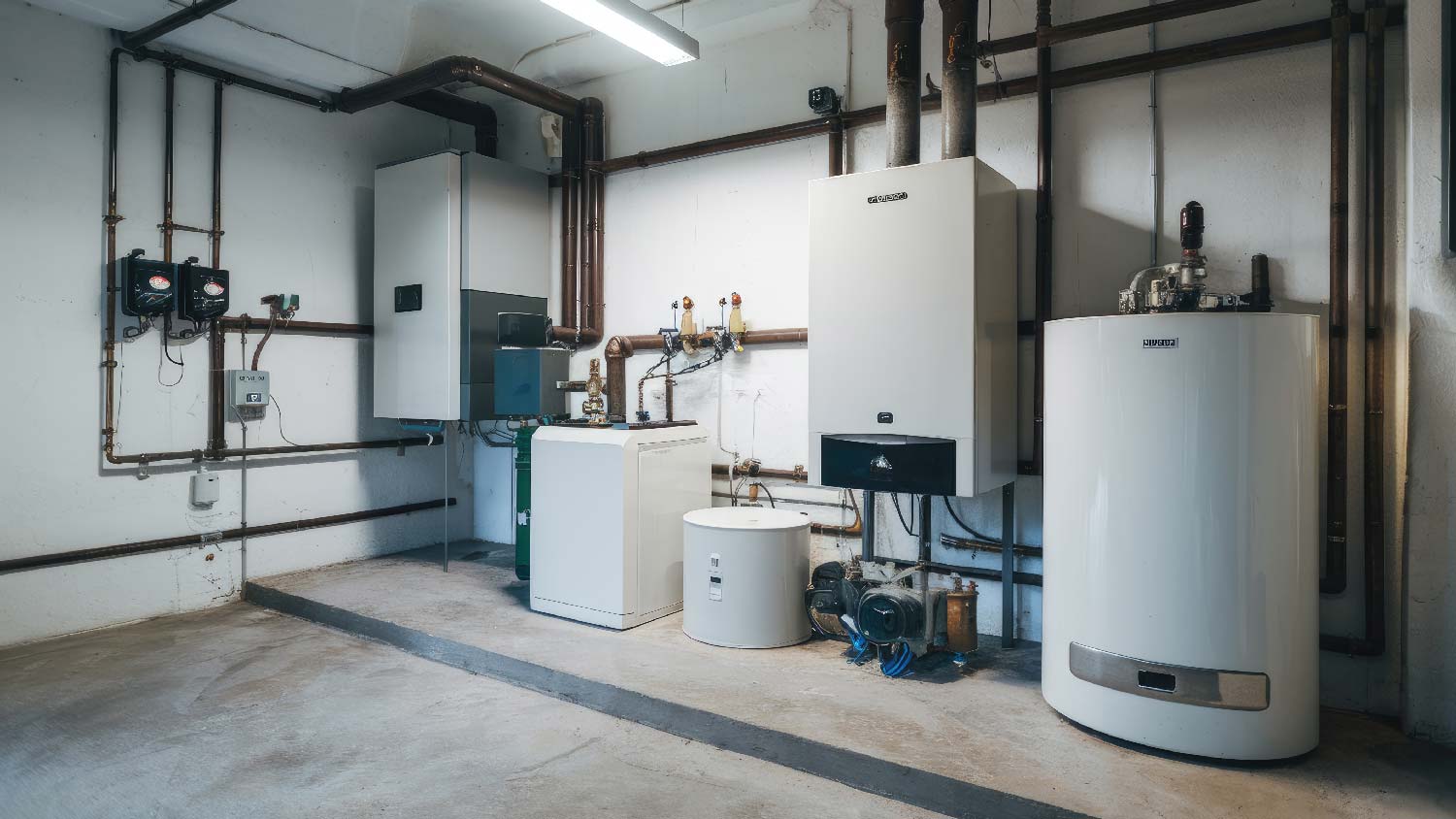
Learn about the different factors that go into water heater gas valve replacement costs to see if you should DIY the project or call a pro.
Water heater service costs depend on your project and location. Check with a local pro for your specific job.
Water heater repair costs depend on the price of the broken part, labor rates, and the length of the job.
While simple DIY fixes can cost less than $20, more complex problems can set you back hundreds of dollars.
Plumbers charge between $50 and $140 per hour for water heater repairs.
If the damage is extensive, replacing your water heater may be more cost-effective, ranging from $850 to $1,800.
The average water heater repair cost is $605. That said, some homeowners pay as little as $90 to get their hot water heater running again, while others spend upwards of $1,779. A water heater is an essential appliance often taken for granted, but repairs can be urgent when the unit acts up or stops working altogether. This guide will explain what factors to consider when estimating your water heater repair cost and what you can expect to pay.
As with any appliance, water heater repair costs vary based on the part you need. Typical water heaters have more than a dozen parts, ranging in size and price. Take a look at some part estimates below, which don’t include the labor fees to replace them.
| Water Heater Part | Average Price |
|---|---|
| Anode rod | $25–$75 |
| Dip tube | $25 |
| Gas burner | $175 |
| Gas valve | $70–$200 |
| Heating element | $15–$60 |
| Thermostat | $20–$400 |
Each water heater component serves a unique function. Many small parts cost $50 or less, but your total could reach the hundreds with the labor prices. Still, this is more affordable than a full water heater replacement, which typically costs between $850 and $1,800.

Water heater repair prices range from simple DIY fixes under $20 to more complex problems that can cost hundreds. The following issues occur in both electric and gas heaters. If you have a different type of water heater—like a heat pump vs. tankless water heater—you could be on the hook for additional repairs.
Water heater leaks aren’t something you should ignore or try to handle on your own. You’ll want a local plumber to take a look. A leaking valve could only require simple tightening and cleaning, or the outlook might be more grim.
Let’s rip the band-aid off: if there’s water in your water heater pan or underneath the unit, there’s most likely a leak in the tank. Unfortunately, this usually indicates corrosion or other internal damages you can’t fix. You’ll have to get a new water heater for between $850 and $1,800.
If the pressure inside the tank gets too high, the pressure relief valve safely takes care of it. Periodic gushing usually means it’s doing its job, but a steady “leaky” type of trickle could mean a few things:
There is sediment buildup in the valve
Your tank’s pressure is too high
You need a new pressure relief valve
Replacing the pressure relief valve could cost up to $200 if a plumber comes out, or it’s a $20 part that requires a couple of basic tools. Always turn off the unit, shut off the gas, and let the water cool down before attempting replacement.
If your water can’t stay hot for long, a broken or corroded dip tube is likely to blame. Dip tubes cost about $25, with an average professional replacement cost of $150. In both electric and gas heaters, this part carries new, cold replacement water down to the bottom of the tank while the hot water is in use.
If you’re hearing noises coming from your water heater, that’s probably sediment. It’s not just annoying: if left alone, it might lead to leaks, heating element failure, or a broken unit. Having a plumber flush it ASAP is a good idea for around $200.
By design, the anode usually needs to be replaced before your water heater fails. On average, a new anode rod costs between $20 and $50. Labor to hire a water heater pro to replace the anode rod costs between $50 and $150 per hour, and most plumbers can do this in an hour.
Replacing a water heater anode isn’t a job for beginners, so if you don’t have plumbing experience, call a professional. An improperly replaced anode rod could drastically reduce the life span of your hot water heater.
The anode rod is a steel rod coated with aluminum, aluminum/zinc alloy, or magnesium. It’s designed to corrode before the interior wall of your tank, so it’s a sacrificial rod that you’ll need to replace regularly. Rust and corrosion are inevitable when heat, water, and metal play together, and they shorten the life of your hot water heater. The electrons from the anode attract and settle minerals in the water that can otherwise build up and corrode the water tank.
You should check the anode rod for corrosion and deterioration every few months. Drain and flush the hot water heater once or twice a year to slow corrosion in the water tank. The anode rod should be replaced at least every five years.
The expansion tank attached to the water supply pipe of your hot water heater is a reservoir for the water that expands when heated. It acts as pressure relief for the tank when water expands as it heats up. Expansion tanks typically need to be replaced once during a water heater's lifetime. You can expect to pay between $100 and $400 for parts and labor to replace them.
Lukewarm water coming out of your shower could indicate several issues, such as a thermocouple problem in a gas unit or a heater element failure in an electric unit. Costs vary based on your style because they require different parts and expertise to fix. The two main categories are gas and electric water heaters.
Gas water heater repair costs come from pilot light problems, thermostat issues, or a failed thermocouple. Each displays different symptoms with varying water heater repair prices that go with it.
First, try lighting the pilot light again. Make sure you can do it safely. If you don’t want to do this, a service call might cost you a trip fee of around $50 to $150, as most plumbers can do this in a few minutes.
Problems with your gas heater’s thermostat require repairing or replacing the whole valve unit. A new one will cost you about $80, but it can cost around $200 if you include labor.
If your pilot light stays lit but the burner isn’t lighting, this often means a problem with your thermocouple. The thermocouple senses the pilot light and uses this signal to trigger gas from the gas control valve. Calling a pro to replace this part should run you about $150 or less and take under an hour.
This valve keeps the gas on for the pilot light and is responsible for turning the gas off when the pilot light goes out. This is a job for a water heater repair professional near you. A bad gas valve can make your hot water heater unsafe, as a gas leak can cause explosions. Gas valve replacement costs about $350 on average on a hot water heater.
A few problems are unique to electric water heaters. These involve tripped breakers, faulty heater elements, and bad thermostats.
If it’s only a tripped breaker, that’s great. Just reset it and start planning the bubble bath you’ll have later. This should always be your first check if your hot water heater isn’t working, as it will cost you nothing but a minute of your time.
Electric water heaters have two heater elements: one on top and the other on the bottom. If one fails, a very cold and sad shower will follow shortly. Having a water heater element repaired professionally usually costs about $200 to $300.
Each heating element has its thermostat; if those don’t work, the elements won’t either. Hiring a pro to replace a thermostat averages around $150 to $200. The part itself costs up to $20 and is easily replaceable without disturbing other components if you have some DIY experience.
Most plumbers charge between $50 and $150 per hour, depending on the experience of the professional. You’ll notice that the prices often entail a small, inexpensive part with a comparatively large charge for labor. If you’re not the type to tinker with appliances that can burn you, or if you’re not comfortable with your diagnostic abilities, the peace of mind and time you save is well worth the cost.
When budgeting for labor, consider how advanced your water heater is. The more high-tech the appliance, the more expensive the repair could be. For example, a condensing tankless water heater has additional components that a non-condensing unit doesn’t, which could raise the price.
Different areas of the U.S. have varying prices for water heater repair. Here are some average water heater repair costs for different cities:
| City | Average Water Heater Repair Cost |
|---|---|
| Boston, MA | $20–$1,200 |
| Chicago, IL | $220–$950 |
| Denver, CO | $20–$1,000 |
| Houston, TX | $220–$900 |
| Jacksonville, FL | $200–$850 |
| Los Angeles, CA | $250–$1,000 |
| Memphis, TN | $200–$850 |
| Nashville, TN | $200–$900 |
| New York City, NY | $250–$1,200 |
| Philadelphia, PA | $220–$950 |
| San Francisco, CA | $300–$1,200 |
| Seattle, WA | $250–$1,100 |
| Cleveland, OH | $200–$900 |
| Indianapolis, IN | $200–$850 |
| Portland, OR | $250–$1,000 |
| Charlotte, NC | $200–$900 |
The prices mentioned above should cover most of the expenses for repairing your water heater, but other factors could increase your total.
The location of your water heater in your home can affect the repair costs. If the appliance is in a tight or hard-to-reach area, like a cramped utility closet or a small crawl space, the local water heater repair pro might take longer to complete the repairs, driving up the labor costs.
The flue pipe sends exhaust gases from your hot water heater to the outside of the home. The cost to replace the PVC flue pipe depends on length, material, and accessibility, but you can expect to pay between $100 and $350.
Some hot water heaters have timers that allow you to set times when the unit does or doesn’t heat the water. Replacing the timer costs between $100 and $350 for parts and labor.
Preventative maintenance is one way to get the longest, most efficient use from your hot water heater. Having a professional give it a regular tuneup will cost between $100 and $500, including a drain and flush, inspection for corrosion or leaks, cleaning parts like the burner, and testing parts like valves and water composition.
Tankless water heater maintenance costs are close to regular tank water heaters. The big difference is life expectancy, with tankless water heaters lasting up to 20 years or more, compared to 10 to 15 years for traditional tank water heaters.
Most hot water heaters last about 10 to 15 years, so if yours is within that range or beyond, consider a full replacement, which will cost between $880 and $1,800. Replacing a piece at a time on a unit in this age range will quickly add up to the cost of a full replacement.
Water heater problems often require a small repair. Sometimes, however, it will take a heavier lift to get your water heater performing correctly again, and replacing your water heater may be more cost effective. On average, the cost to install a new water heater runs from $880 to $1,800.
How do you know when to replace your water heater? Here are a few signs:
It’s near the end of its life span: Conventional water heaters last 8 to 12 years, while tankless water heaters can perform well for roughly 20 years. If your water heater is malfunctioning and it’s near the end of its projected life span, it’s not worth throwing money at the repairs since it’s liable to have other issues in the future. Instead, take this opportunity to install a new water heater.
It’s in a bad location: If your water heater was installed in a place that doesn’t make sense—i.e., it’s too far away from the actual dispense points such as faucets, the dishwasher, and the clothes washer, or it’s in a cramped location that makes maintenance and repairs difficult—don’t bother repairing the existing water heater. Instead, relocate it to an area that makes more sense (your trusted local water heater installation pro should be able to recommend it) and upgrade to a new, more efficient water heater during this process.
It’s inefficient: Older water heaters tend to run less efficiently than new ones because technology always improves, and they’re likely to have wear and tear. If your monthly water bill steadily increases, it may be time to get a new water heater.
It’s experiencing a larger issue: Small water heater repairs for minor problems make sense, but the cost of water heater repair for large issues—such as a leaking water heater, discoloration in the water, or inconsistent water temperatures—can be almost as much as the cost to replace the unit entirely. In those cases, weigh the pros and cons of repairing versus replacing the water heater to determine if it’s worth spending more on a brand-new unit.

One way to save money on hot water heater repairs is to handle them yourself. But that’s only for jobs that don’t require expert training. The labor cost for hiring a professional plumber ranges from $50 to $150 per hour, which means DIY could save you a few hundred dollars. Here are some other ways to save money.
Insulate the hot water tank and pipes with insulation rated for these items. This helps reduce heat loss and makes your water heater work less to keep the water hot. You’ll save money on energy bills immediately, plus the life span of your appliance will increase.
If you’re having hot water heater problems and your unit is 10 to 15 years old, replacing it may save you money in the long run rather than continuing to repair parts that are likely to keep failing. When parts stop working, they put extra stress on the other ones, and things wear out faster.
Even if the plumber gets a better rate on parts, it still takes time, and the components may have a markup. Check with your plumber to find out if you can save money by purchasing parts and having them ready when they arrive.
Sometimes, water heaters break at the worst time (like on a weekend or holiday). If the repair isn't an emergency and you can afford to go without hot water for an extra day, scheduling a service call during the work week helps. Also consider repair or maintenance in the off-season, as winter is the busiest time for water heater repair technicians.
Your water heater likely came with a warranty when it was installed. Refer to the warranty to see what is and isn’t covered—and for how long. Depending on the issue and when you installed the water heater, the warranty may cover the repair work. Remember, keeping up with routine water heater maintenance is key; ignoring required maintenance can void the warranty (as can DIY installs and repairs).
If your water heater warranty expires, you may not be out of luck. Check your home warranty if you have one. While most base home warranties do not cover water heaters, your unit might be covered with a top-tier plan.
Simple fixes to your water heater—like reigniting the pilot light—can be tackled as a DIY project. But if you don’t have much experience with plumbing, electrical, or gas work, we highly recommend leaving most water heater repairs to the pros.
Incorrectly repairing your water heater can make it less efficient, and the work itself (especially when gas is involved) can be dangerous. Local water heater repair contractors also offer sound advice about whether to repair or replace the unit and can diagnose more complex issues that most homeowners would overlook.
Repairing a water heater requires experience with electrical, plumbing, and gas components. Here’s why it’s best to hire a pro for a safe, lasting repair:
Professionals know how to quickly diagnose and repair issues to prevent further damage, leaks, and complete system failure.
Hiring a pro ensures your repair meets safety standards and local building codes.
DIY repairs can lead to flooding, gas leaks, electrical hazards, and worsening damage.
Professional repairs extend your system's lifespan, improve efficiency, and provide peace of mind.
If you want to help out your pro with the repair process, consider taking on smaller tasks like:
Clearing furniture, decor, and obstacles from around the water heater before your pro arrives.
Shutting off the water, gas, and power as directed by your pro.
Keeping tools and equipment nearby and easily accessible.
Cleaning up the area and wiping down your unit after the repair is complete.
Clearly explain the type and extent of damage to your pro so they can assess the situation thoroughly.
Provide your pro with the type, size, and location of your water heater.
Ask your pro about add-ons like energy-efficient upgrades, expansion tanks, or smart controls.
Leave room in your budget for hidden damage that may be discovered during the initial inspection.
Home is the most important place on earth, which is why Angi has helped more than 150 million homeowners transform their houses into homes they adore. To help homeowners with their next project, Angi provides readers with the most accurate cost data and upholds strict editorial standards. We’ve surveyed over 10,000 real Angi customers about their project costs to develop the pricing data you see, so you can make the best decisions for you and your home. We pair this data with research from reputable sources, including the U.S. Bureau of Labor Statistics, academic journals, market studies, and interviews with industry experts—all to ensure our prices reflect real-world projects.
Want to help us improve our cost data? Send us a recent project quote to [email protected]. Quotes and personal information will not be shared publicly.
From average costs to expert advice, get all the answers you need to get your job done.

Learn about the different factors that go into water heater gas valve replacement costs to see if you should DIY the project or call a pro.

Learn all the factors that influence the cost to install a heat pump water heater at your home.

While solar water heater costs are a bit higher than a standard system, this energy-saving option could pay for itself in a few years. Here’s what you need to know.

Hot water expansion tanks help protect your home by preventing an overflow of your water tank. Learn why you may need one, how much they cost, and their benefits.

Do water heater blankets work, or are they just hype? Find out the energy-savings truth behind this addition and whether it's worth it.

Common causes for a water heater that keeps tripping a breaker include a damaged heating element or thermostat. Keep reading to find out other common reasons.